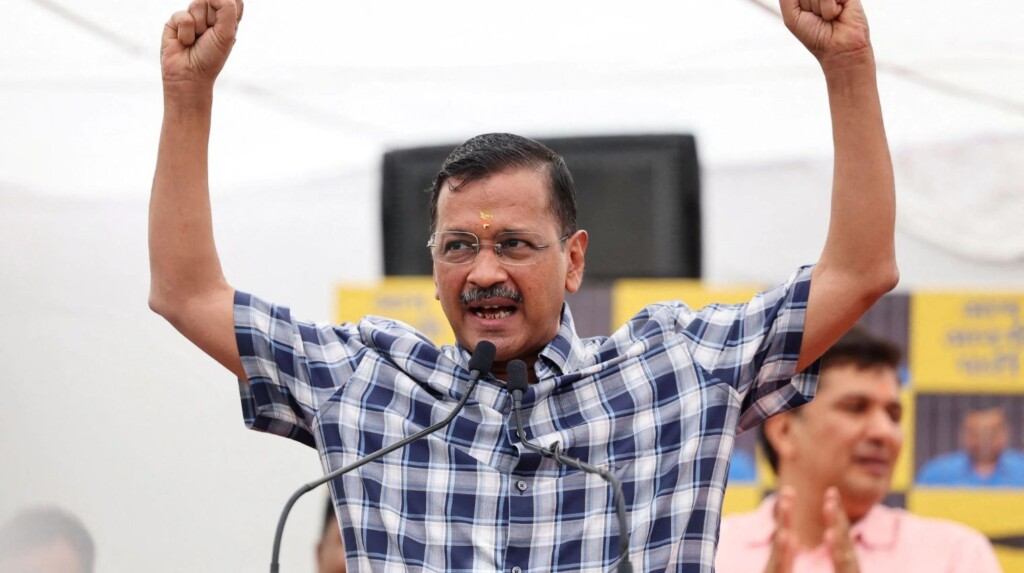Arvind Kejriwal, the chief minister of Delhi, was granted bail by the Supreme Court today in relation to the CBI’s formal complaint on the Delhi liquor policy.
In the case brought by the Central Bureau of Investigation (CBI) over the purported Delhi Liquor Policy fraud, Delhi Chief Minister Arvind Kejriwal filed petitions contesting his arrest and requesting bail. The court rendered a decision in both cases.
On September 5, a bench consisting of Justices Surya Kant and Ujjal Bhuyan heard the case and reserved a decision. Each judge handed out a distinct ruling.
According to Justice Kant, there were no procedural irregularities involved in Kejriwal’s arrest, and it was deemed legal. Justice Kant ruled that the argument that the CBI violated Section 41 of the Code of Criminal Procedure in its detention of him is without merit.
However, taking into account that the chargesheet has been submitted and that the trial is unlikely to be concluded very soon, both judges unanimously decided to grant Kejriwal bail. In this instance, interim bail will be granted subject to the same restrictions that the coordinate bench imposed in the ED case.
This would imply that Kejriwal is not allowed to enter the Chief Minister’s office or the Delhi Secretariat, nor can he sign official documents until absolutely essential to get the Lieutenant Governor of Delhi’s assent.
Justice Bhuyan questions the CBI arrest
Regarding the necessity and need for arresting Kejriwal, Justice Bhuyan disagreed with Justice Kant, who affirmed the arrest. According to Judge Bhuyan, the CBI’s detention was made solely to thwart Kejriwal’s bail in the money laundering case.
Judge Bhuyan pointed out that Kejriwal was apprehended by the CBI just before his release in the ED case, having been out of custody for 22 months.
It seems that the CBI didn’t become involved and ask for detention until the Trial Court gave the appellant in the ED case ordinary bail. It was more than 22 months before it felt the need to arrest. Such a move calls into serious doubt the validity of the arrest itself.I don’t understand why the CBI felt it was so urgent to arrest the appellant in the ED case just before his discharge.Judge Bhuyan declared that the appellant’s belated arrest was unwarranted.
Given that Kejriwal was granted bail in the money laundering case despite the strict limits outlined in the Prevention of Money Laundering Act (PMLA), it is no longer feasible for him to remain in custody for the primary offense (the CBI Case) under the Prevention of Corruption Act. Judge Bhuyan noted that keeping the appellant in detention on these grounds is a travesty of justice, particularly because he has been granted bail in a more rigorous PMLA case.
Concerns were also raised by Justice Bhuyan over the bail requirement that Kejriwal not attend the Secretariat or the CM’s office. He did not, however, issue a directive in that way because he respected the authority of a coordination bench and judicial discipline.
The CBI was also reminded by Justice Bhuyan of its need to guarantee the impartiality of its investigations.
“CBI is a top-tier investigative organization. It is in the public interest that the CBI be considered to be above board as well as above board. It is imperative to make every attempt to dispel any impression that the inquiry is not conducted impartially and that the arrest was made in an arbitrary and prejudiced way. Perception is important in a legal democracy that functions well. An investigating agency ought to be above board, just like Caeser’s wife was. This Court had already chastised the CBI and likened it to a parrot in a cage. Justice Bhuyan stated, “It is crucial that the CBI dispels the idea of being a caged parrot; instead, the perception should be that of an uncaged parrot.”
In his current appeal, Kejriwal contested the August 5 Delhi High Court ruling that had rejected his motion to stay his CBI arrest and given him permission to request bail from the trial court. In an effort to overturn the High Court’s decision to reject his bail request, he had also submitted a second special leave petition.
On June 26, 2024, the CBI formally arrested the AAP chief as he was being held by the Enforcement Directorate in connection with a money laundering case involving the purported liquor policy fraud.
A few weeks later, on July 12, Kejriwal was granted interim bail by the Supreme Court in the money laundering case, but his plea against the ED’s detention was referred to a higher bench. But because the CBI had arrested him, he had to stay in custody, which started on March 21.
It is appropriate to note that this year, the Supreme Court granted bail to Manish Sisodia, K Kavitha, Vijay Nair, and Sanjay Singh—the other co-accused in the liquor policy case. Recently, Arun Pillai, Chanpreet Singh, and Sameer Mahendru were also given bail by the Delhi High Court.
